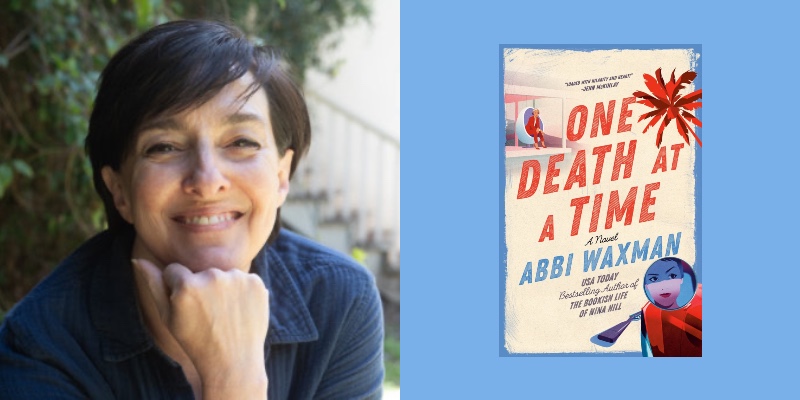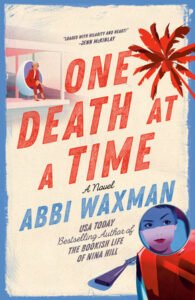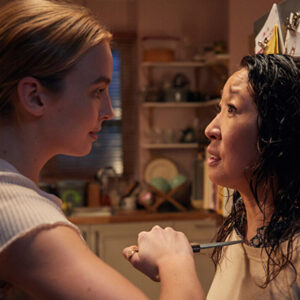It is a truism that children imitate. You do what you see. If I had grown up the child of an electrician, possibly I would be rewiring something right now, rather than writing this essay, but as the child of a mystery writer… here I am.
My mom is Paula Gosling, who published 15 mysteries during her career, both series with returning detectives and stand-alone novels. She was pretty successful, she won the Gold Dagger (the British Crime Writers Association’s top award), the John Creasey award for best first crime novel, and one of her books was turned into not one, but two absolutely terrible movies. (Fair Game, featuring Cindy Crawford and Cobra, a cult classic with Sylvester Stallone, which featured an axe-wielding biker gang that I can assure you was NOWHERE in the novel). She worked for thirty years and retired quite happily, having supported us with her work, and ready to hang up her keyboard. She says she ran out of things to say.
However, while her career success was pleasing and interesting to watch, that’s not where her main influence lay. The first and most important thing I learned was that writing is a job, one that you do every day, more or less, and that it’s hard. Fun, sure. Rewarding, occasionally. But hard. And that if you’re a writer you’re going to write whether you like it or not, and maybe you’ll get lucky and get published, but it’s not guaranteed. And that secondly, if you’re a crime writer, you’re a bit bananas. A weirdo, albeit gently.
Let me be clear. My mother was, and is, a sweet and charming woman. However, she and her crime writing friends tended to look at the world as a constant, teeming pond of potential murder and violence. I would often find her sitting with the newspaper, gazing into space, because the brief overview of a recent death had sent her into a reverie of speculation. Why was the fishmonger found in the library? Why were there chopsticks in his pocket? And why were his hands so clean? It wasn’t even that she especially liked murder, or violence, she wrote ‘cozies’ because she was pretty squeamish actually, but she was…deeply interested. She would watch people talking to each other and narrow her eyes. Possibly they were planning a hit. She made friends with policemen whenever possible, and asked our doctor about decomposition after he’d checked us for chicken pox. She liked puzzles and weird facts and wore a poison ring (whose little compartment she would demonstrate gleefully). She was…a little strange.
Her work also meant, on a practical level, that there were a lot of questionable books in the house, books we had ready access to. Books about forensics. Books about weaponry. Books about autopsies (with pictures, and yes, now I know what someone looks like when they’ve been hit by a train, don’t google it). She loved to research, to get the details right. She essentially retired before the internet became what it is, so everything was at the library, and we spent a lot of time in the children’s section while she requested books that made the librarians look at her strangely.
And of course we read mysteries. Our house was full to bursting with books, because along with everything else our Mom was a Book Hoarder. So we read Agatha Christie, Dorothy Sayers, Rex Stout at al, alongside Flat Stanley and the Oz books. It was a childhood filled with wonder, but also with violent, unexpected death.
When I started writing novels myself, my first was a mystery. It was dreadful, truly. I believe there were hidden passages and a twist that was foreshadowed from the dedication onwards. Then I wrote a mystery that was better, but in the process realized that plotting a crime and then hiding it, which is essentially the task at hand for a mystery writer, was difficult, and not my strong suit. So I switched, like the lazy candy-ass I am, to what I call domestic fiction: light-hearted novels about real life, about love, about family and children and romance. I wrote what I knew, and I got lucky and got published. But the mystery haunted me, and with every book I published I would ask my editor if we could work on it…and she would kindly say no. My agent concurred: The rom coms, she said, are going great, stick with what’s working. So I did. And then the market changed, as markets will, and Richard Osman’s books came out, and Only Murders in the Building was successful, and suddenly the window for my mystery opened.
I went back and completely rewrote it. About fifteen times. I hired a friend of mine, a very successful TV writer, to read it and make suggestions about the plot. It was enormously helpful. I struggled and stuck post cards on a board and tried to make everything fit. Having pushed so hard to be able to write a mystery, I started to question my own sanity.
But I remembered my mom. She was unusual, she talked openly about how to get away with murder, but she never quit. She would have long conversations with my step-dad, overheard in the kitchen, in the living room, through their bedroom door, about the plot. He was not a writer, but he would make suggestions, or ask questions, and she would push through and make it all work. I knew it was supposed to be challenging, so I kept going and got as much help as I could. I also stuck with my strengths, creating strong characters first and building the crime around them. Hopefully, it works.
After all is said and done, writing crime fiction was clearly something I was predisposed to do, and I have my mom to thank for that. I hope she enjoys my first mystery as much as I enjoyed reading hers. And when I look at my kids, watching me go through this process, I can safely assume they think I’m weird too. It’s ok, it runs in the family.
***


















